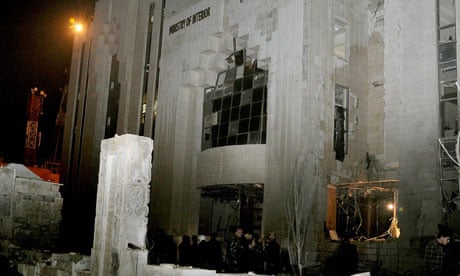Forces loyal to Bashar al-Assad's regime have fired Scud missiles at rebel fighters in Syria, according to US and Nato officials, in what appears to be a further escalation of the conflict.
In Brussels, a Nato official expanded on a report in the New York Times, saying that a number of short-range ballistic missiles had been launched inside Syria.
"Allied intelligence, surveillance and reconnaissance assets have detected the launch of a number of unguided, short-range ballistic missiles inside Syria this week … Trajectory and distance travelled indicate they were Scud-type missiles," said the Nato official.
Meanwhile, Syria's new opposition body received full political recognition from more than 100 countries on Wednesday in a move that takes it a step closer to being declared a government-in-exile.
The nascent organisation, known as the Syrian National Coalition, immediately reached out to the country's Alawite community, a core Assad constituency which has largely remained loyal to the regime throughout the 21-month crisis.
Chastened by criticism that opposition members had done little to convince minorities that they have a stake in a post-Assad Syria, the coalition's new leader, Moaz al-Khatib, called on Alawites to rise up against regime rule.
"We send a direct message to the Alawite brethren," he said. "The Syria revolution is extending its hand to you, so extend your hand back and start civil disobedience against the regime because it repressed you like it repressed us."
The coalition's messages at the "Friends of Syria" meeting in Morocco were carefully tailored to a receptive audience that pledged around $250m (£150m) in aid – $100m each from Qatar and Saudi Arabia alone.
However, while denouncing the extremism that has crept into some elements of the armed opposition, Khatib, a former imam of the Umayyad mosque in Damascus, called on the US to reconsider its move to designate the Jabhat al-Nusra group as a terror organisation.
"The decision to blacklist one of the groups fighting the regime as a terrorist organisation must be re-examined," Khatib, told the meeting in Marrakech. "There is nothing wrong with fighting in the name of Islam.
He added: "We can have ideological and political differences with certain parties, but the revolutionaries all share the same goal: to overthrow the criminal regime of President Bashar Assad."
The statement is unlikely to have been well received in Washington, which will welcome Khatib as the official leader of Syria's opposition, following an invitation given to him at the conference by the deputy secretary of state for the Middle East, William Burns.
The US designation of Jabhat al-Nusra, which Washington says is an alias for al-Qaida in Iraq, was made on Tuesday after months of examining the group's emerging role in the civil war, especially in eastern and northern Syria and in Damascus.
While eschewing Jabhat al-Nusra's radical, sectarian ideology, many Syrian rebel units refuse to condemn the group, because it is giving them a military edge that they cannot produce by themselves. The decision to proscribe the group has not gone down well with some rebel units, but was strongly defended by Burns. "The step that we took with regard to the designation of the al-Nusra Front raises an alarm about a very different kind of future for Syria, about the direction that a group like al-Nusra will try to take Syria to impose its will and threaten the social fabric of Syria," he said.
Three bombs, at least one of them a suicide bomb – a hallmark of Jabhat al-Nusra – were reported to have been detonated outside Syria's interior ministry late on Wednesday, killing at least four people and wounding more than 20.
Large-scale bombings have battered Damascus since early this year and the capital remains an active war zone, with rebel groups on the southern outskirts attempting to oust loyalist forces who control the central city, the heart of the regime's power base.
While providing the opposition with the political legitimacy it had coveted throughout the past year, western backers continue to balk at providing weapons to the rebels. France said on Wednesday that it had not yet reached a decision to arm the rebels, while William Hague said Britain was reserving all options. "I believe that of all the meetings we have had so far for the friends of Syria, this will turn out to be the most significant," he said. Earlier meetings had ended in a failure to get earlier incarnations of the coalition to act as a cohesive, or inclusive political body.
The US and European states have invested much diplomatic capital since late in the summer in establishing convincing structures in both the civilian and military side of the opposition that could be used to channel desperately needed aid into Syria.
Distributing the aid will be the first challenge for the new group, which now must deal with an emerging humanitarian crisis. More than 2 million people have been internally displaced by fighting that has ravaged cities and small communities and left large numbers of the population, who are now in the grip of winter, barely able to meet subsistence needs.
"We look to the coalition to continue creating more formal structures within the opposition and to accelerate planning for a democratic political transition that protects the rights, the dignity and the aspirations of all Syrians and all communities," Burns said, announcing that the US had pledged $14m towards direct humanitarian aid.







